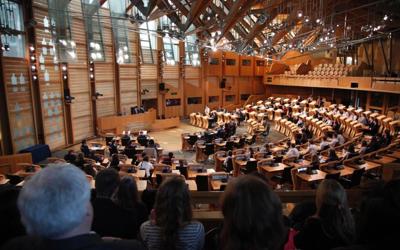Overview
Every election matters. Elections are times of great national debate where ideas and visions for the country are shared, argued and challenged. Whether a government is returned or replaced, this is also a time of political renewal where our political leaders govern with a fresh mandate from the people.
This General Election on 4 July offers another key moment for our nation’s history and our democracy. With over 100 MPs standing down, we know that whatever the overall outcome, the election will see new faces and fresh thinking emerge in our UK Parliament.
For 75 years, the Law Society of Scotland has played a key role in helping to encourage and facilitate informed public policy debate. Across UK and Scottish elections, and more recently through national referendums, we have sought to ensure our political decision makers are informed and public debate is conducted in an open and respectful manner.
As the professional body for over 13,000 Scottish solicitors and a proudly non-partisan organisation, we have also sought to provide informed independent expertise where we can. At a time of great challenge for the UK, both at home and abroad, we believe this kind of open debate is more important than ever.
As we approach this election, we believe the next parliament and the next government must not just deliver for justice, they must actively champion it.
A fair and democratic society relies on justice. Our nation operates on the basis of the rule of law and the separation of powers. A just society has equality at its core, where each individual’s rights are not just respected, but cherished.
The success of our economy relies too on a thriving legal sector as a commercial engine in its own right, and to support the many other sectors on which the UK’s economic success depends.
This is why we believe this must be a justice election.
In this document, we set out our key asks of the next House of Commons and the next UK Government, whatever its political make up. With so many issues affecting justice devolved to the Scottish Parliament, we have focused our priorities for this election on those matters still reserved by law to the UK Parliament.
However, we will continue to be active on the many pressing issues which our Scottish Parliament and Scottish Government must address. We believe that, whatever the outcome of this UK election, Holyrood must progress much needed reform to criminal and civil justice, improvements to and investment in legal aid, and delivering long overdue reforms to legal services regulation.
Nevertheless, for the next UK Parliament and UK Government, we are arguing for a strong political commitment to human rights, renewed administrative justice to help protect the public interest, improved decision making, support for education and diversity, financial crime reform, and improved international trading arrangements.
Prioritising these areas will have real benefits for the legal sector and the wider public. We hope this document enhances the debate now ongoing and widens engagement as we strive to strengthen our justice system, improve our economy and protect society’s most vulnerable.
Championing the rule of law
Championing the rule of law
The rule of law is fundamental to our society and our constitution. It provides legal certainty, equality before the law, and protects people’s individual rights. It helps avoid the abuse of power by the state and for such abuse to be challenged in a fair and open manner.
The rule of law is good for our economy too. It underpins social functioning and stable economies by providing clear and legitimate dispute resolution mechanisms and facilitating the elimination of corruption.
None of this should be taken for granted.
On too many occasions, we have seen the rule of law challenged and cast into doubt. Our courts have been required to step in when it was felt our democratic institutions were being sidelined. We have seen deeply concerning public attacks on our independent judiciary by those in positions of power and influence. Some have questioned whether we should remain part of internationally agreed treaties on human rights. Here in Scotland, we continue to work hard to ensure the legal sector always remains free from political interference and control.
We believe the next government, and all those in positions of power, must do all they can to respect the rule of law, protect human rights, and preserve an independent legal sector. All are fundamental to a fair and democratic society.
Impartiality and independence are vital to lawyers who must operate independently of the government of the day. There must be no restrictions on their ability to give advice and to act without fear or favour from the state. That is why the independence of the legal profession, and the judiciary in particular, is such an important principle. The incoming government must not only adhere to these pillars, but actively promote their importance.
We also look forward to a human rights bill in the Scottish Parliament, and entrenching UN conventions into Scots law. The incoming government should look to retain all the substantive rights currently protected under the ECHR. Particularly in relation to immigration and asylum, convention rights must be protected for refugees, and their human rights under the 1998 Act restored.
We believe the next UK Government should:
- Follow their obligations to support and promote the rule of law.
- Commit to maintaining the UK as a full signatory to the European Convention on Human Rights.
- Further embed UN conventions into domestic law.
- Respect our independent legal system by ending the damaging use of inflammatory and derogatory language about lawyers and judges who uphold individual rights and ensure everyone acts within the law.
- Ensure the smooth operation of our justice system by ensuring our courts are funded properly and that access to justice is available to all, not just those who can afford it.
Ensuring the proper functioning of administrative justice
We believe that development of Scotland’s administrative justice system would materially assist the creation of a fairer and more just society. Administrative justice allows individuals to enforce their rights against the state where governments have acted wrongly or unjustly.
The pandemic has sharpened the focus and it is now clearer than ever that our administrative justice system requires a fundamental reappraisal. This reappraisal requires an assessment of the principles by which it should be guided and the outcomes the system seeks to achieve.
Given the wide range of issues covered by the administrative justice system, and different ways that administrative justice disputes are resolved, ensuring that these principles are holistic requires creativity and innovation. It was originally the Administrative Justice and Tribunals Council (AJTC) who put together a set of principles of administrative justice which still hold true.
To ensure the proper functioning of a good administrative justice system, these should:
- Make users and their needs central, treating them with fairness and respect at all times;
- Enable people to challenge decisions and seek redress using procedures that are independent, open and appropriate for the matter involved;
- Keep people fully informed and empower them to resolve their problems as quickly and comprehensively as possible;
- Lead to well-reasoned, lawful and timely outcomes;
- Be coherent and consistent;
- Work proportionately and efficiently;
- Adopt the highest standards of behaviour, seek to learn from experience and continuously improve.
We believe the next UK Government should:
- Set out Administrative Justice Principles in legislation. The principles should apply to all administrative decisions and will help to protect the public interest, improve decision making, and ensure consistency.
Promoting access to justice
A justice system is only fair if it is open and available to everyone. Ensuring access to justice - whatever your background, abilities and financial status - should be a guiding principle for any democratic government.
A lot of this can come down to investment, including legal aid, something administered in Scotland by the Scottish Government through the Scottish Legal Aid Board. However, the operation of justice plays a key role too in ensuring all those who depend on our courts and tribunals can get the access they need.
We know that, like society as a whole, technology has a chance to transform the way justice works. The wider use of technology is vital to ease of use, efficiency, modernisation, and addressing historic backlogs of cases.
Equally, we must always be mindful of those who are digitally excluded and ensure the justice system is open and accessible to all who need it. This is particularly important for vulnerable members of our society, including vulnerable accused. Their needs must be considered and their rights preserved so that everyone can access justice in a fair and equal manner.
The proper use of technology will help to mend issues facing our justice and court systems, and will assist in cutting backlogs further. Similarly, the rapid growth in the use of artificial intelligence brings opportunities and challenges. As such, any efficiencies from IT must be weighed against fair and equitable access. The use of alternative dispute resolution (mediation, arbitration, and others) should also be considered more widely to take pressure away from courts where it is right and appropriate to do so.
Of course, access to justice covers devolved and reserved matters. There must be consistency across reserved and devolved matters to ensure ease of use, efficiency and modernisation so that nobody is disadvantaged just because of the type of case being heard.
We believe the next UK Government should:
- Progress a considered increase in the use of technology in our justice system, whilst making sure it remains fair and open to everyone.
- Consider opportunities for more funding and investment in the operation of our courts to modernise and to improve access to technology for all.
- Bring forward clear plans on how the opportunities and threats from emerging technology and AI can be addressed to best serve our justice system.
- Work with the Scottish Government to ensure a consistency, where possible and appropriate, in how IT is used in court
A system that protects the public from financial crime
A critical part of the Law Society’s work is protecting the public through robust and fair regulation. The Scottish solicitor profession has a reputation across the world for its skill and competence. However, we know the actions of a few can damage that hard won standing.
While most of our regulatory activity is covered by statute devolved to the Scottish Parliament, our work to prevent and address anti-money laundering (AML) flows from powers given to us by the UK Government. It is a responsibility we take extremely seriously.
The Law Society’s dedicated and committed AML team undertake a range of risk-based, proportionate measures to ensure our members meet the highest legal and ethical standards so public trust is upheld. We also provide a breadth and depth of information and guidance to the profession to support them in their AML and economic crime obligations.
We have undertaken our AML work for a long time and we do it well.
The incoming government will have to make decisions quickly about AML supervisory reform. We support further powers being given to the Office of Professional Body AML Supervision (OPBAS), if those powers would lead to increased effectiveness. We did not oppose reform to consolidate anti-money laundering supervision on a devolved basis.
We believe the next UK Government should:
- Respect the distinct legal structures which underpin the regulation of the profession in Scotland by allowing the Law Society to continue acting as AML regulator for the Scottish solicitor profession.
- Bring a renewed focus on domestic, cash-based money laundering threats, which blight communities and underpin serious and organised crime at a local and regional level.
- Ensure any forthcoming changes to the UK Money Laundering Regulations prioritise those AML controls which have the most impact, in order that regulated firms can allocate resources effectively, proportionately and appropriately.
- Continue a focus on the implementation of Economic Crime Plan 2 through to 2026 - including the strengthening of the National Crime Agency’s Kleptocracy Cell, and the implementation of effective supervision of sanctions legislation.
The future of the profession
Scottish solicitors assist clients across the full spectrum of society every day. It is important that the legal profession reflects the society it represents and that talented young people from all walks of life see a future career in the law as attainable and desirable.
Much has been done by the Law Society of Scotland and our partners in recent years to improve social mobility and routes to the profession, including our Street Law programme and the Lawscot Foundation.
Covid-19 has revolutionised our approach to flexible working. We know that more flexible and family-friendly working can build a more diverse profession, help tackle the gender pay gap and make sectors more agile and appealing to a wider range of candidates.
The Scottish legal profession also benefits greatly from those who choose to study here. We want those talented people to stay. We believe the removal of the Graduate Visa Route would have a detrimental impact on Scots universities and the legal profession. Without this option, many foreign Diploma graduates would likely struggle to achieve a sponsored role as a trainee solicitor.
Decisions around immigration requirements from the UK government will impact the legal sector in Scotland significantly. The current government proposed substantial increases to the required minimum salary to sponsor an employee visa. This risks closing a number of sectors - including the Scottish solicitor profession - to international skills and labour. If increases in threshold takes the minimum salary above our own recommended rate of remuneration for trainees, then this could significantly impact on our ability to attract international talent.
We believe the next UK Government should:
- Consider equality and diversity in policies which impact legal professionals and take action to address and eliminate disadvantages in the workforce.
- Particularly commit to keeping the graduate visa route and look at thresholds for salaries to make sure we attract and retain talent and that being a solicitor in Scotland, and across the UK, is attainable for all talented young people.
Trade and Scotland on the global stage
Whatever people’s views on the outcome of the 2016 referendum and the decision to leave the European Union, there has been a renewed focus on the UK’s international relationships, especially our arrangements on trade.
Cross-border trade is essential to the legal sector. Many of the law firms operating in Scotland work and offer legal services internationally. We also have a growing number of Scottish solicitors who work in-house in other countries, offering valuable expertise and legal knowledge to the companies and organisations they serve.
UK legal services are distinct across the jurisdictions. It is important that in trade negotiations the Scottish legal sector is promoted equally with the English legal sector.
Equally, the legal services sector is a huge economic enabler. Whether on financial services; Scotland’s thriving food and drink sector; travel and tourism; or oil, gas and renewables, solicitors help to facilitate trade globally.
This includes contract negotiations for the provision of goods or services, and also advice on matters such as entry requirements and intellectual property protection. Businesses of all types are increasingly international in focus and global in reach and Scottish solicitors must be able to provide their services accordingly.
Furthermore, trade agreements create legal rights and obligations. It is therefore imperative that individuals and business have access to legal advice to allow them to exercise those rights and meet the requirements of their obligations.
As the new government seeks to pursue new trade deals or enhanced deals with existing trading partners, we hope to see preferential ‘fly-in-fly-out’ (short-term visits to foreign jurisdictions for the purposes of providing legal advice) provisions for Scottish solicitors. In certain cases, we also want the ability to establish a permanent commercial presence without the need for a local sponsor. In practical terms, this must be supported by efficient business visa systems which allow lawyers to enter a country for the purposes of meeting their clients face-to-face whilst protected by legal professional privilege.
We believe that a whole-of-governance approach should be taken when conducting trade negotiations. This is particularly relevant where international agreements bind domestic legislatures to effect changes in domestic law. We therefore support the Scottish Parliament and Scottish Government having a role in the setting of objectives and scrutiny of trade deals.
We believe the next UK Government should:
- Show support to ensure the Scottish legal sector is properly promoted in trade negotiations including seeking to secure preferential fly-in-fly-out provisions and, where it is right to do so, a deal to allow law firms to establish a permanent commercial presence without the need for a local sponsor.
- Formalise the role of the Scottish Parliament and Government in setting objectives and scrutinising trade deals.

Our responses to consultations
Our responses to recent consultations on various areas of law.

Our input to parliamentary bills
To help shape good law, we regularly provide responses and briefings related to bills from Holyrood and Westminster.

Legal Services Regulation
In 2015 we set out our ambition to secure a modern, flexible and enabling legislative framework to improve legal services regulation - read more about our work.


